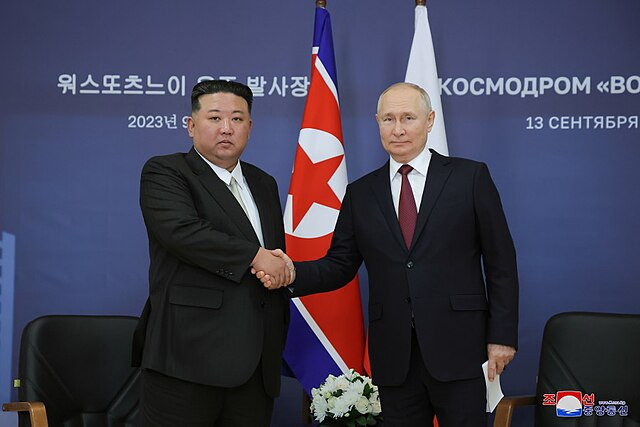North Korea has pledged unwavering support for Russia in its war in Ukraine, a move that marks a deepening of the military alliance between the two nations. During high-level talks in Moscow, North Korean Foreign Minister Choe Son Hui assured Russian Foreign Minister Sergei Lavrov that Pyongyang would stand by Moscow until a "great victory" was achieved. Choe's statements underscore a strengthening of North Korea's military ties with Russia, a relationship that both countries are openly promoting amid rising tensions with the United States and its allies.
"Our traditional, historically friendly relations, which have traveled the tested path of history, today...are rising to a new level of relations of invincible military comradeship," Choe remarked in her address, adding that North Korean leader Kim Jong Un and Russian President Vladimir Putin were instrumental in fortifying this alliance. Choe voiced confidence in Putin's "wise leadership" and expressed North Korea's certainty that Russia would succeed in its "sacred struggle to protect the sovereign rights and security interests" of its nation.
Lavrov echoed Choe's sentiments, referring to the "very close ties" between the Russian and North Korean militaries, which he suggested enable both countries to jointly address critical security concerns. "Very close contacts have been established between the military of the two countries and along the security services line," Lavrov stated, highlighting what he described as a shared focus on mutual defense. Lavrov thanked North Korea for its "principled position" in backing Russia against what he described as Western encroachment and the "openly racist regime" in Ukraine.
Neither Lavrov nor Choe publicly addressed recent claims from U.S. officials that thousands of North Korean troops had been deployed to assist Russian forces near Ukraine. On Thursday, U.S. Secretary of State Antony Blinken asserted that approximately 8,000 North Korean soldiers were stationed in Russia's Kursk region, where Ukrainian forces had made recent incursions. Blinken suggested these troops would soon engage in combat operations, although Russian officials have neither confirmed nor denied their presence.
Choe's statements on Friday also took aim at the United States and South Korea, which she accused of conspiring to launch a nuclear attack against North Korea. Although she provided no evidence to support these claims, Choe described regular "consultations" between Washington and Seoul as evidence of such intentions. She warned that the situation on the Korean Peninsula could escalate to an "explosive" level at any moment, insisting that North Korea would continue to develop its nuclear arsenal and prepare for potential retaliatory strikes.
According to Choe, the support pledged to Russia stems from a mutual defense agreement signed in June, which includes provisions for military cooperation and mutual defense between the two countries. The treaty, she said, is meant to serve as a bulwark against threats from the United States and its allies. "And we also assure that until the day of victory we will firmly stand alongside our Russian comrades," she declared.
The strengthening of this alliance has raised concerns among U.S. and NATO officials, who view North Korea's military involvement in Ukraine as a potential destabilizing factor. North Korea's longstanding hostility toward the U.S. and its allies, combined with recent weapons tests and nuclear advancements, has led to heightened scrutiny of its actions on the global stage. Moscow, which launched its invasion of Ukraine in February 2022, has recently faced renewed calls from Western leaders to de-escalate its campaign. Nevertheless, Putin's administration has continued to stress its right to make decisions independently of international pressures.
The Kremlin, for its part, has largely refrained from commenting on North Korea's alleged troop deployment to Russia, with Kremlin spokesperson Dmitry Peskov stating on Friday that he had "nothing to add to what has already been said" about such statements. However, Putin previously hinted that the specifics of the mutual defense treaty between Russia and North Korea would be left to Russia's discretion, particularly regarding implementation on Russian soil.
Some experts interpret North Korea's support for Russia as a strategic move aimed at aligning with a powerful ally while underscoring its independence from the U.S.-led global order. "This deepening alliance signals North Korea's willingness to leverage its military capabilities in ways that challenge U.S. influence and expand its international presence," said Paul Martin, a security analyst at the Center for Strategic Studies.
This article includes reporting from Reuters and Al Jazeera.




